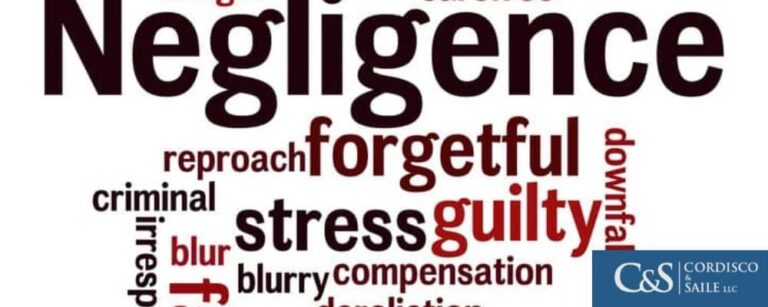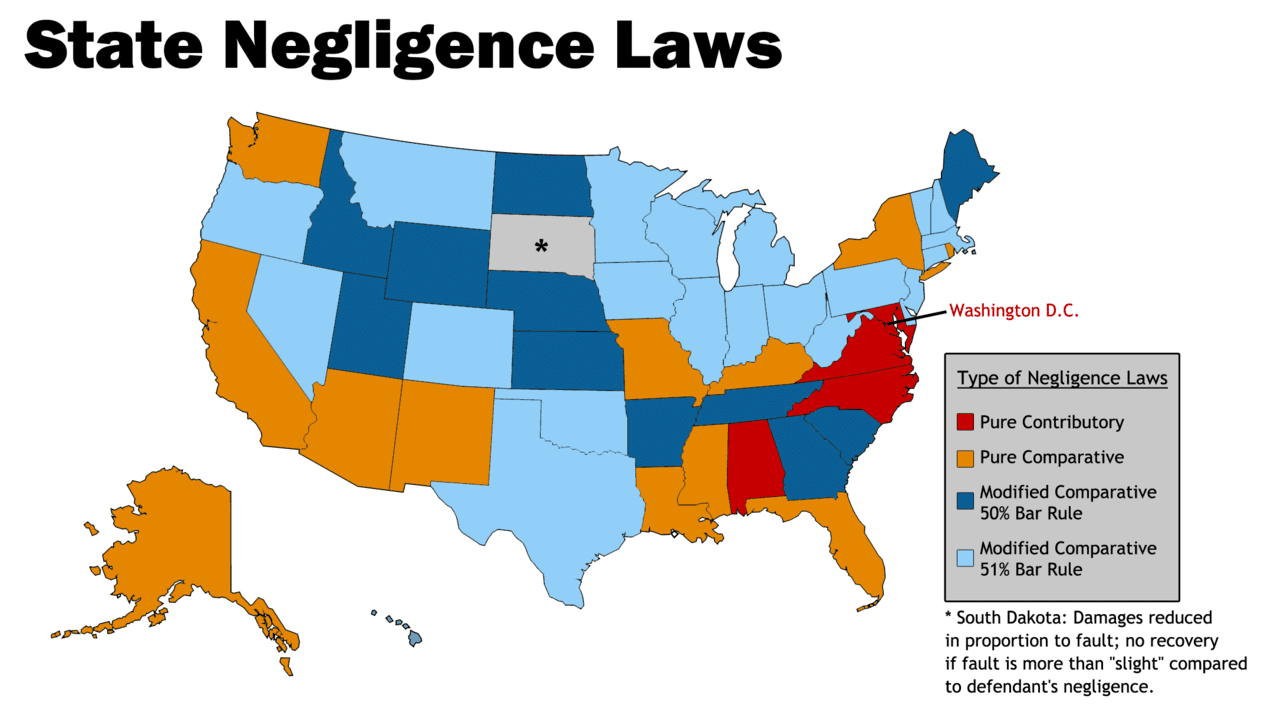Like most states, Pennsylvania comparative negligence laws allow individuals who’ve been injured in an accident to recover compensation for damages – even when they are partly at fault for the accident (contributory negligence). However, depending on your degree of shared fault, your ability to recover damages might be affected. The damages you can seek may be limited, or, in some cases, you might not be barred from compensation altogether.
If you have been injured in any kind of accident – particularly one in which you might be partially at fault – you’ll want to discuss your case with a personal injury attorney in Pennsylvania for help with your claim.

Understanding the Concept of Negligence
Negligence, a type of wrongdoing that results in another person sustaining injury or harm, is a viable legal tort in which victims have a right to file a civil claim and seek compensation from the at-fault party. Injuries and damages caused by negligence often stem from a person’s carelessness or lack of appropriate action.
All personal injury claims or lawsuits are founded on the concept of negligence. Negligence is best understood in light of another key element of injury cases: duty of care. Duty of care refers to the responsibility everyone has not to cause harm to others. Drivers, for example, have a duty of care to all other road users. They must drive and conduct themselves in a safe manner, so they don’t injure anyone. The same holds true for doctors who have a duty of care to their patients, and property owners who have a duty of care to visitors.
Negligence occurs when someone has breached their duty of care, such as when someone drives while intoxicated and endangers everyone else on the road or when a doctor fails to administer proper diagnostic tests.
How is fault determined in an accident?
The insurers or courts will examine all the facts of the case closely and determine which party(ies) caused or contributed to the accident. Fault most typically is assigned to a party who is found to have acted with negligence or recklessness, i.e., those whose actions fall outside the boundaries of reasonably safe behavior.
A number of factors will be considered when assigning fault, and the types of pertinent evidence depend partly on the type of accident. For a car accident case in Bensalem or other cities in Pennsylvania, the courts/insurers might look at evidence such as:
- Police accident reports (especially when one or more drivers are cited for violating a Pennsylvania traffic law, such as speeding or disobeying a traffic signal)
- Photos of the accident scene and vehicle damage
- Witness testimony (especially when witnesses can attest to a driver’s actions just prior to a crash, such as weaving in and out of traffic or closely following other vehicles)
- Cell phone records (particularly useful if the defendant is suspected of having violated Pennsylvania’s ban on texting while driving)
- Surveillance or red light camera footage
When you speak to your attorney, he or she will determine which types of evidence you’ll need and then go about helping you gather it.
Get legal help from a legal team that will never stop fighting for you.

Comparative Negligence Laws in Pennsylvania
Comparative negligence laws, found in Pennsylvania General Assembly Statute §7102, state that a plaintiff’s contributory negligence does not bar him or her from seeking compensation for damages, as long as he or she was less negligent than the defendant.
In other words, if you were injured in an accident, you can hold a level of fault for the accident and still recover damages. Under this law, each party in a negligence claim is assigned a percentage of fault. This percentage reflects how much their action (or inaction) contributed to the accident and injuries. Note, Pennsylvania follows a 51 percent comparative negligence rule, which means you can recover damages if you were less than 51 percent at fault. If you are found to carry more than 50 percent of the fault for the accident, you will be unable to seek compensation for damages.
It’s important to grasp the importance of these percentages in a personal injury case. The statutes provide that your degree of fault directly correlates to the amount of compensation you are due. For example, if you are deemed to hold 20 percent of the fault, you will be entitled to only 80 percent of the settlement award.

Fair Share Act in Pennsylvania
The Pennsylvania comparative negligence laws go hand-in-hand with the Fair Share Act of Pennsylvania. The Fair Share Act, put into legislation in 2011 as the Senate Bill 1131, dictates that defendants can be held liable only for their share of fault.
This act usually comes into play when there is more than one defendant. Let’s say there’s a multi-car collision, and the injured accident victim files a suit against two other drivers, one who is 55 percent at fault and the other who is 45 percent at fault. Under the Fair Share Act, rather than being responsible for the whole settlement regardless of the percentage of fault, defendants are only responsible for their exact share of fault. In this example, the driver who was 45 percent at fault will be liable only for 45 percent of the damages awarded to the injured party, and the driver 55 percent at fault will be liable for the remaining 55 percent of the damages.
There’s an exception to this rule, though. If a defendant is found to be 60 percent or more at fault for the accident, the Fair Share Act mandates that he or she will be responsible for the entire amount of damages awarded.
Getting Help from an Attorney
Because identifying and proving fault is such a crucial part of an injury case, it’s highly advisable to obtain counsel from an attorney before moving forward with your claim or suit. If the other party skirts fault or pins too large of a portion of it on you, you could miss out on a huge portion (or even all) of your compensation check. A lawyer will help gather the evidence necessary to prove your case and present it in a clear, convincing manner so that you can get the full amount of compensation you’re due.
For an who handles various types of personal injury cases in Bethlehem and other cities in Pennsylvania, consider Cordisco & Saile LLC as your firm of choice. We are passionate about helping our clients secure the settlements they need and deserve. The sooner we start on your case, the more time we’ll have to investigate and assemble all of the necessary proof to establish any contributory fault.
Contact us today at 215-791-8272 or fill out our online contact form to schedule a free consultation.






